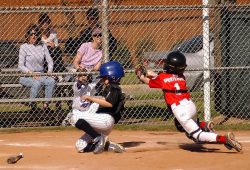The Difference Between a Fixed & Growth Mindset
 Posted On
Posted On
There are two opposing types of mindsets, psychologist Caroll Dweck argues, a fixed and growth. A child with a fixed mindset sees their skills and weaknesses as inherent, something they were born with. It’s a “you have it or you don’t” thought process. Often, they spend the majority of their lives seeing an area (that could be an opportunity for growth) as hereditary or “I am just not good at it”. If they happen to have success in that area, they are shocked and elated and attribute it to good luck. In contrast, failure only reminds them that they are flawed and defective.
For example, a child with a fixed mindset with a weight problem may think, “ I have no self-control” or “I am no good at sports so I don’t exercise”. This self-defeating attitude only perpetuates more failure. These children have mirrored the behavior of parents with a fixed mindset and fixed motivation.
Raising a child to view life with a growth mindset is a gift that can take an average child to greater heights. That same overweight child could view the weight gain as a challenge to learn a new sport not view this issue as having a defective body or bad genes, or even worse, a failure.
If you compare these two mindsets, a growth/malleable vs. fixed in the academic world you will see two striking differences. A child who has grown up being praised about their higher learning abilities worry about how they are seen: smart vs. dumb. When the text in school becomes more complex, they feel cheated, that they have been duped into believing they should already know the connections and relationships. Not surprisingly, when it doesn’t come easily to them, as they have been taught it would, they fall to pieces or even worse, stop trying. This is why you see some very bright children perform average once they reach middle or high school when the curriculum becomes more challenging. Our educational system is letting some very bright children slip through the cracks because of this mindset and instruction.
A child with a growth mindset would take complex text and see it as an opportunity to apply study skills, basics of literacy that have already been mastered and ask for help. Yet, children with a growth mindset aren’t always mature enough to know the appropriate sequence of steps. They can be gently guided, they will listen, they will communicate, they are MOTIVATED. They could take a complex concept, for example, the consequences and implications in Aesop’s Fables and break it down into smaller, learnable steps. Can I put the events of the story in proper sequence? If a word is unfamiliar, can I read the passage for context or draw on my vocabulary knowledge of root words? Can I ask the teacher for some online resources? Communicating the lack of understanding is just as essential for growth as putting the effort in.


